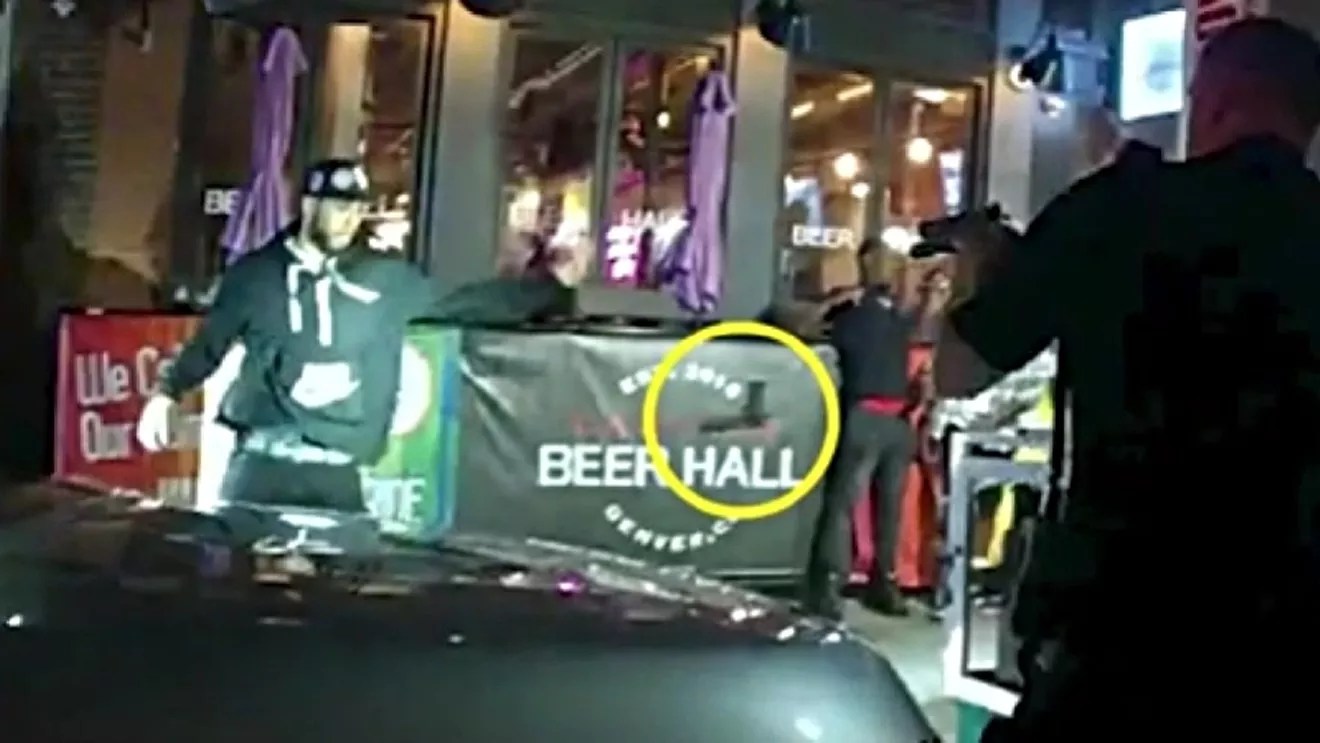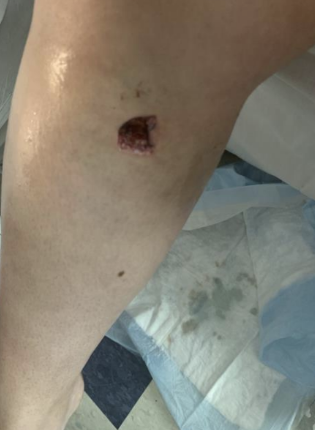
Denver Police Department via Tyrone Glover Law/YouTube

Audio By Carbonatix
Angelica Rey went downtown on July 16, 2022, to celebrate a recent promotion. The celebration ended abruptly when she was one of six innocent bystanders shot by Denver Police Department officers outside Larimer Beer Hall at 20th and Larimer streets.
The trouble started when 23-year-old Jordan Waddy got into an altercation with another man on the street, which was crowded with people who’d left the bars after last call at 2 a.m. on July 17. Waddy attracted the attention of DPD officers monitoring the crowd, who suspected that he had a gun. The officers went up to Waddy, ordering him to get down. Though Waddy threw his gun away from his body and put his hands up, three police officers fired their weapons, injuring Waddy and six others who happened to be in the crowd.
Denver District Attorney Beth McCann charged Waddy with third-degree assault and three counts of possession of a firearm by a previous offender; he is scheduled for arraignment on April 21. McCann also called in a grand jury to investigate whether the three officers involved in the shooting should be criminally charged.
In January, that grand jury determined that officers Kenneth Rowland and Meghan Leiberman had acted legally, but Officer Brendan Ramos was indicted on ten criminal charges, including second- and third-degree assault, negligence with a deadly weapon, prohibited use of a weapon, and reckless endangerment.

Arrest photo of DPD Officer Brandon Ramos.
Denver District Attorney
According to the grand jury, when Ramos fired his gun, he did so in a manner that was “reckless, unreasonable and unnecessary for the purpose of protecting himself or other officers, and he consciously disregarded an unjustifiable risk of injury to the crowd.”
Rey was one of those who was injured: She was shot in the leg and fell to the ground. “As soon as the shots rang out, the panicked crowd started to flee the area, and nearly trampled Ms. Rey, who was now bleeding profusely. Her blood flowed across the sidewalk and into Larimer Street,” according to a lawsuit that Rey filed against Ramos in Denver District Court on March 7, asking for damages for financial losses and emotional distress related to the shooting.
The bullet severed a nerve in Rey’s leg. While she was still in the hospital, Rey’s brother reached out to attorney Anthony Viorst, who spent ten years in the Colorado Public Defenders Office and has handled excessive-force cases since then. “She wanted justice in this matter and didn’t want to wait around,” says Viorst, who’s representing Rey. “It’s been nine months now. She was ready to move forward.”
The lawsuit argues that Ramos violated the Colorado Constitution. Peace officers who violate a person’s rights are liable for “equitable relief, costs and attorney fees related to any injuries suffered by that person as a result of the constitutional violation,” the suit notes.
In 2020, the Colorado Legislature passed a major police reform bill that included eliminating qualified immunity, a broad legal protection that shields law enforcement officers from legal liability. The new law allows people who have “a right, privilege, or immunity secured by the Colorado Constitution that is infringed upon to bring a civil action for the violation.”
In shooting Rey, the suit contends, Ramos violated Rey’s right to freedom from unlawful seizures. “In the common parlance, seizure is grabbing someone, but shooting someone and stopping them with a bullet is also a seizure,” Viorst says.
The Colorado Governmental Immunity Act, last amended in 2012, gives any government employee in the state immunity from civil lawsuits for negligence while on duty. However, in cases where that employee acts willfully and wantonly, that immunity goes away.
“Recklessly is basically the same thing, and the grand jury found that he actually acted recklessly,” Viorst says.
The filing also notes that Ramos’s actions violated the DPD’s own operations manual, which “provides that lethal force may not be used against a suspect when it creates a substantial risk of injury to other persons in the area.”
The DPD says it cannot comment on Rey’s lawsuit owing to pending litigation and the criminal charges Ramos faces; he’s scheduled for a status conference on April 17 in Denver District Court.

Angelica Rey was shot in the leg by a Denver officer.
Lawsuit filing
Rey is seeking damages from Ramos for being saddled with a permanent injury that will impact her wages and quality of life. If Rey is granted money through the criminal case, that amount would be subtracted from any judgment in the civil case.
“Ramos may be ordered to pay for medical bills as part of the criminal case, but that’s just a fraction of her losses in the grand scheme of things,” Viorst says. “She was a full-time employee at the preschool and she was a room leader. Now she’s part-time and she’s not a room leader. She can only work part-time. She can’t stay on her feet long enough to be full-time.”
The City Attorney’s Office says that it cannot comment on either case, but does note that while neither the DPD nor the city were named in Rey’s lawsuit, it will not be representing Ramos, who has been suspended without pay from the DPD.
The criminal and civil cases shouldn’t interfere with each other, Viorst says, unless Ramos is scheduled to be deposed in the civil case before he goes on trial for the criminal charges. “He might not want to talk to us about the civil case while the criminal case is pending,” Viorst says, noting that he could take the Fifth.
But this is unlikely to be the last of the cases against Ramos. Viorst says that others who were shot that night plan to file suits soon.
In the immediate aftermath of the shooting, police briefly banned food trucks from operating on busy streets, saying it did so to eliminate some of the crowds that gather after the bars let out. Some bar operators suggested that staggering let-out times by making last call more flexible could help make the end of the night calmer, but the legislature has yet to take that up this session.
In the meantime, there continue to be violent incidents in the area, including a February 26 killing at 20th and Market streets, a block away from the July shooting; the DPD arrested a suspect on March 2 who’s been charged with manslaughter.